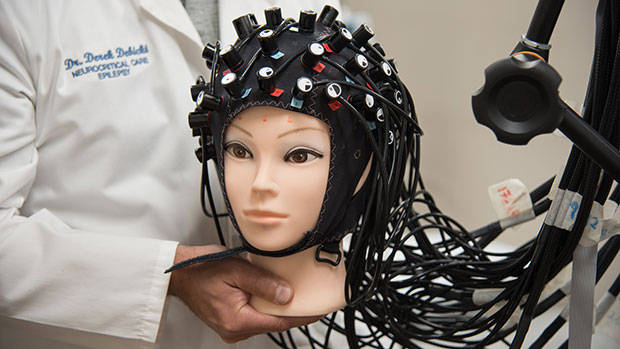LONDON, ON – Researchers at Lawson Health Research Institute and Western University are using a new brain imaging technique to detect preserved consciousness in the intensive care unit (ICU) at London Health Sciences Centre (LHSC) in patients that appear to be in a coma following a severe brain injury.
In a groundbreaking discovery published in The Proceedings of the National Academy of Sciences (PNAS), researchers used functional near infrared spectroscopy (fNIRS), a portable brain imaging technique, to examine whether unresponsive patients in the ICU had preserved consciousness by recording brain activity at their bedside.
For the study, the research team led by Dr. Karnig Kazazian, Dr. Androu Abdalmalak, and Dr. Derek Debicki used fNIRS to determine if patients can feel pain, hear their surroundings, and perhaps most crucially, retain preserved conscious awareness. They first tested this technique on more than 100 healthy individuals before using fNIRS to identify a patient in the intensive care unit who, despite being unresponsive, was able to demonstrate appropriate brain responses to the instruction “imagine playing a game of tennis,” which showed that they were aware.

“These findings could fundamentally change the way patients are cared for,” said Dr. Kazazian, Research Associate at Lawson Health Research Institute and LHSC, and Associate Scientist and medical student at Western University’s Schulich School of Medicine & Dentistry. “Deploying a simple tool like fNIRS at the bedside has the potential to provide clinicians information about preserved brain function that standard clinical tools are not capable of doing.”
This discovery builds on more than 20 years of research from renowned Western neuroscientist Dr.Adrian Owen, who first discovered that some unresponsive patients are entirely aware based on results from brain recordings. It also expands on recent advances made the research team using fMRI and EEG in patients with severe brain injury.
“Families of patients with severe brain injuries want to know whether their loved ones will be able to recover from their injuries,” said Dr. Debicki, a Neurologist at LHSC, Assistant Professor of Neurology at Schulich Medicine & Dentistry and Scientist at Lawson. “fNIRS is an exciting new tool that we can use at the bedside in the ICU to improve the way we answer this very important, complex question."
Beyond making predictions about outcomes, fNIRS may provide a unique opportunity to interact with patients who are aware but unable to be physically interactive.
“The next steps are incredibly exciting, as expanding the testing to a larger group of patients will enable us to explore the potential of using fNIRS to communicate with ICU patients, potentially unlocking groundbreaking advancements in patient care,” said Dr. Abdalmalak, co-first author of the study and former Research Associate in the Owen Lab at Western University’s Schulich School of Medicine & Dentistry.
Lawson Health Research Institute is one of Canada’s top hospital-based research institutes, tackling the most pressing challenges in health care. As the research institute of London Health Sciences Centre and St. Joseph’s Health Care London, our innovation happens where care is delivered. Lawson research teams are at the leading-edge of science with the goal of improving health and the delivery of care for patients. Working in partnership with Western University, our researchers are encouraged to pursue their curiosity, collaborate often and share their discoveries widely. Research conducted through Lawson makes a difference in the lives of patients, families and communities around the world. To learn more, visit www.lawsonresearch.ca.
Western delivers an academic experience second to none. Since 1878, The Western Experience has combined academic excellence with life-long opportunities for intellectual, social and cultural growth in order to better serve our communities. Our research excellence expands knowledge and drives discovery with real-world application. Western attracts individuals with a broad worldview, seeking to study, influence and lead in the international community.
Senior Media Relations Consultant
Communications & Public Engagement
T: 519-685-8500 ext. 73502
Celine.zadorsky@lhsc.on.ca


